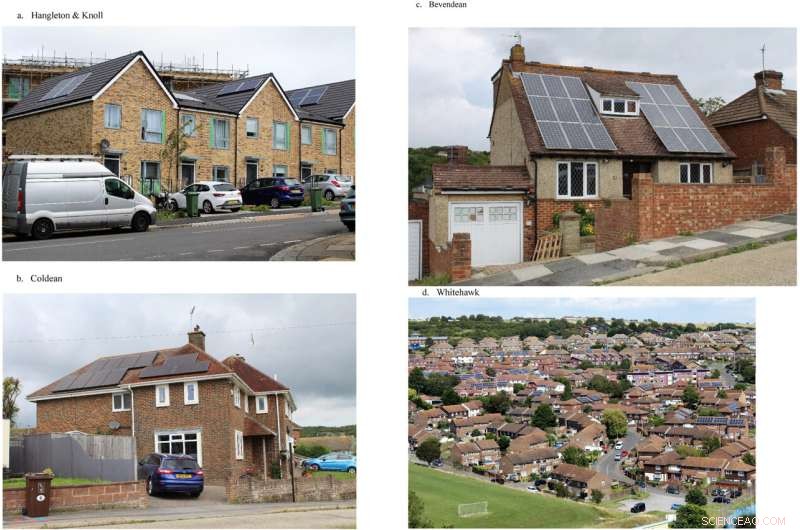
Samplingsstrategi för samhällsintervjuer och grannskapsbesök i fyra områden i Brighton och Hove, Storbritannien. Kredit:Energipolicy (2022). DOI:10.1016/j.enpol.2022.112868
Mer statligt stöd med större flexibilitet behövs för att göra solpaneler till ett hållbart alternativ för äldre husägare, studenthyresgäster och funktionshindrade, varnar ny forskning från University of Sussex Business School.
Forskningen kräver politiska initiativ som skatteincitament och bidrag för att hjälpa till att sänka kostnaderna för att installera solenergi i stadsdelar med hög deprivation. Akademiker rekommenderar att man breddar ut de senaste räntefria lånesystemen för elfordon för att inkludera installationen av solcellspaneler som en del av mer flexibla policyer som tar itu med olika solutmaningar som olika hushåll upplever.
Utvidgning av affärsmodeller för delat ägande, inklusive kooperativ eller rådsledda system som erbjuder solenergiutbyggnad och underhåll till hem som inte kan betala, skulle hjälpa studenter, hyresgäster och icke-husägare att också dra nytta av solcellsutbyggnad, rekommenderar tidningen som publicerades idag i tidskrift Energipolicy. Även om befintliga system välkomnades av hushållen för att hjälpa solcellsanläggningar att rullas ut, identifierade studien efterföljande problem som visar på ett behov av en omprövning av dessa policyer för att säkerställa att de är uppmärksamma på framväxande orättvisor.
Studien identifierade att hushållen upplever att leva med solcellssystem på helt olika sätt och inte alltid fick maximal nytta. Forskningen identifierade några husägare som använde sin solenergigenerering för att motivera ökad användning av elektriska apparater som TV-apparater, torktumlare på sommaren och badtunnor. Forskarna föreslår att progressiva energitaxor eller skärmar i hemmet, som en del av ett paket med bredare energimedvetenhet och åtgärder för att minska efterfrågan, skulle kunna bidra till att motverka detta återhämtningsbeteende.
Författarna identifierade behovet av policyer som mötte utmaningarna med underhåll, reparation, borttagning och återtillverkning av solcellssystem och inte bara deras installation inklusive utökat producentansvar och återtagningssystem för trasiga eller pensionerade solsystem för att hantera ett växande avfallsproblem inom industrin .
Dessutom förespråkar forskarna att åtgärder för att göra PV mer rättvisa och cirkulära kommer att ta itu med orättvisor utöver att gynna hushållen och nå tillbaka till leveranskedjorna. Studien rekommenderar rigorösa industristandarder för insyn i försörjningskedjan, inklusive ändringar av Modern Slavery Act 2015 för att inrikta sig på all teknik med låga koldioxidutsläpp, för att säkerställa att övergången till en koldioxidsnål ekonomi i Storbritannien inte är direkt kopplad till dålig, olaglig eller inhumana arbetsmetoder inom globala solenergiförsörjningskedjor.
Benjamin K Sovacool, professor i energipolitik vid Science Policy Research Unit (SPRU) vid University of Sussex Business School, sa:
"Vår studie visar att användningen av solenergi kan förvärra ojämlikheterna på många olika sätt, inklusive dess tillgänglighet för olika grupper av människor och beroende på om man hyr eller äger sitt hem. Det finns också skillnader när det gäller var människor bor i Storbritannien och tillgängligheten. of a skilled workforce or infrastructure to support solar power, inequity in the way that pollution and waste can impact nature, and a generational imbalance in the future burdens of maintenance and repair and rebounds in energy consumption.
"Our study uncovers previously unexplored inequities, notably the dominance of patriarchal figures in making decisions and having control over household energy, the exclusion of the elderly, student renters, or the disabled, the temporal risk of breakdowns and unexpected failures, and qualitative explanations for solar rebounds."
Dr. Marie Claire Brisbois, Senior Lecturer in Energy Policy in the Science Policy Research Unit (SPRU) at the University of Sussex Business School, said:
"With solar power predicted to grow 30-fold by 2050 and with the potential to meet more than half the globe's electricity demand by the start of the next decade, it is vital that no section of society is left behind in this energy revolution."
The study centered around a novel framework looking at demographic inequities (between groups), spatial inequities (across geographic scales), interspecies inequities (between humans and non-humans), and temporal inequities (across present and future generations).
The researchers analyzed the experience of solar inequities amongst a small sample of early adopters and residents in Brighton and Hove (ranking 205th out of 391 UK local authorities reporting PV installations) to understand how their experiences compared with injustices detailed in research literature and how these experiences might inform policies for a more socially just future rollout of solar PV.
The study identified social awareness of inequities amongst hosts of solar PV systems, and outlines measures that can be taken within solar policy and strategy to improve the justness of future deployments.
Adrian Smith, Professor of Technology and Society in the Science Policy Research Unit (SPRU) at the University of Sussex Business School, said:
"Our fossil-fueled energy systems have already caused iniquitous climate change impacts; policy-makers need to make sure measures for rolling out alternatives, like solar energy, realize their potential for more sustainable and just outcomes."
Dr. Max Lacey-Barnacle, Research Fellow in Just Transitions in the Science Policy Research Unit (SPRU) at the University of Sussex Business School, said:
"The recent announcement by the UK Government around increasing energy security through greater deployment of renewables features an aim to triple the amount of solar power in the UK by 2030.
"In light of this announcement, solar advocates, manufacturers, and policymakers can least afford to ignore the mounting justice issues associated with current patterns of adoption, particularly if this pace of adoption is tied to increasing energy security concerns. Through directly addressing or acknowledging some of the inequities we have outlined in our paper, policymakers can facilitate future solar schemes that may foster greater social acceptance and enhance more equitable outcomes."